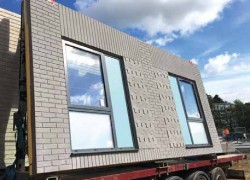The £80million Mount Oswald development is a key part of Durham University’s strategic growth strategy, providing over 1,000 student accommodation bedrooms as well as academic and social spaces for two colleges.
As one of the country’s most successful universities, with a global reputation for excellence, Durham University has ambitious plans to improve the quality of their academic facilities, student experience and ultimately grow their student population. To create a unique identity and promote a sense of belonging, each college needed to look different while still delivering the same scope and functionality. The project also needed to complete for the start of the 2020-21 academic year, and provide benefits for the University and local community, not only during construction, but also for the 50-year life of the buildings.
The use of concrete provided a versatile range of styles and guaranteed a high-quality finish. The offsite solution provided a significant reduction in programme when compared to a traditional construction method, including a reduction of 24,000 hours of brickwork. The solution reduced waste during construction, improved safety onsite and will continue to provide the University with long-term resilience and reduced maintenance and running costs.
Interserve assembled an integrated and experienced team and collaborated from an early stage to adopt a number of new technologies including offsite solutions to realise and support the University’s vision. Willmore Iles Architects and the wider team developed a design which would provide the University with vastly differing buildings while still achieving the same scope and functionality.
As a collegiate university, each college needed to have their own unique identity: the John Snow College building took a more traditional route, while South College is much more contemporary in style. After researching the sector, PCE Ltd were selected for their concrete crosswall system build approach due to its speed, quality and robustness as well as its flexibility and delivery certainty of the solution and on-going low maintenance costs. PCE’s innovative manufacturing approach allowed different finishes for each college, including the casting in of bricks and reconstituted stone finishes for the traditional John Snow College and concrete patternation for South College which was created from the mould during the casting process. PCE’s flexible delivery model meant that an inclusive build strategy could be adopted with everything, including the foundations, being manufactured offsite which resulted in significant reductions in the construction period, on-site work hours and site deliveries compared to that of a traditional construction approach.
Manufacturing offsite allowed sample panels to be created and quality inspected and agreed ahead of mass production, which ensured the highest quality and zero defects. The system chosen also significantly improved health and safety by removing on-site risks through factory installation, e.g. window fitting, eliminating the need for scaffolding or works to take place at height, and reducing the number of trades and equipment needed for the build.
To read full article, go to Offsite Magazine issue 27!









